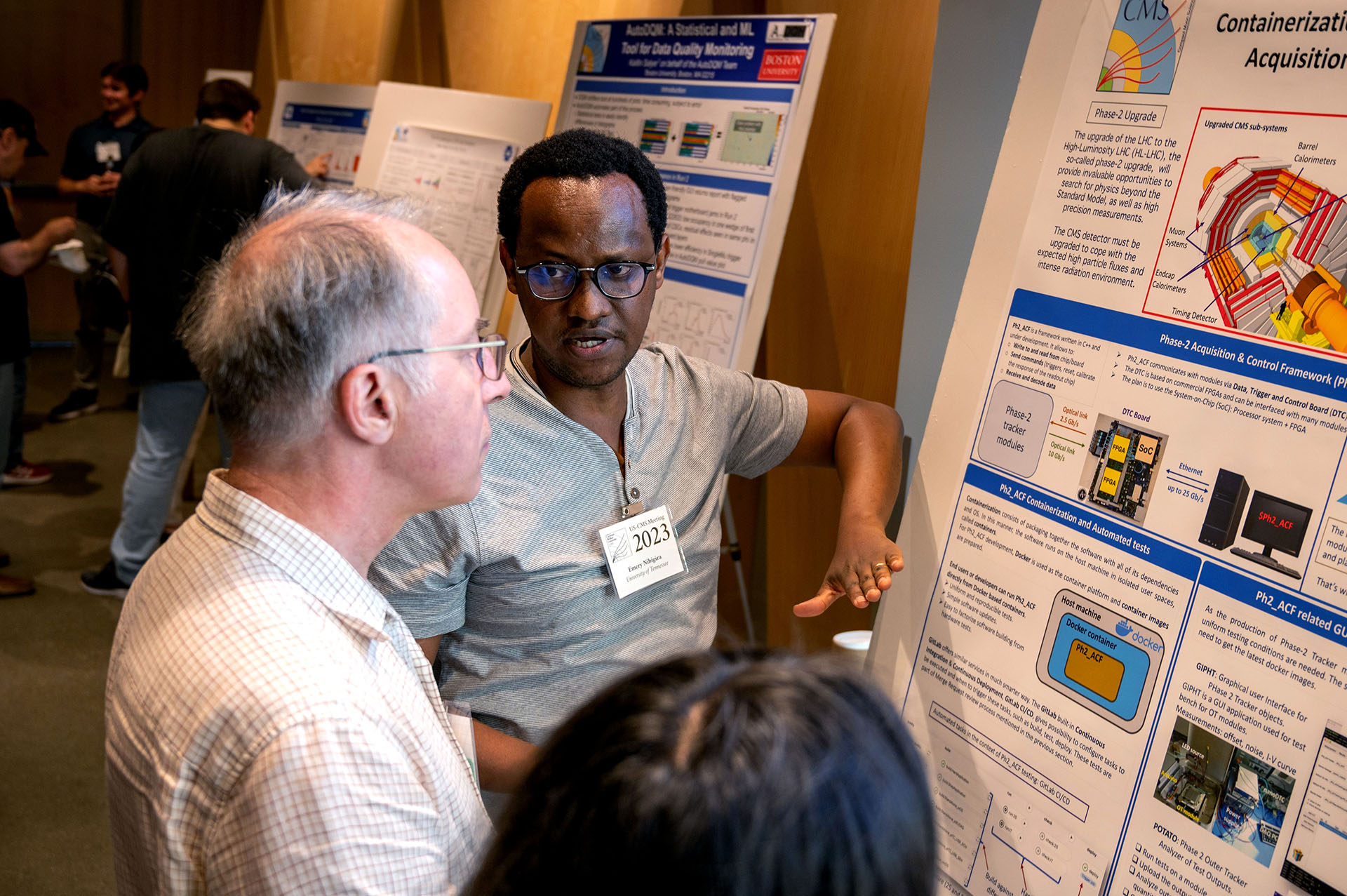

In This Section
CMU Hosts U.S. Physicists Working on CMS Experiment
By Heidi Opdyke Email Heidi Opdyke
- Associate Dean for Marketing and Communication, MCS
- Email jhduffy@andrew.cmu.edu
- Phone 412-268-9982
Carnegie Mellon University alumna Patricia McBride oversees one of the largest scientific collaborations in history, the Compact Muon Solenoid (CMS) experiment at CERN's Large Hadron Collider (LHC). She recently returned to Pittsburgh for the U.S. CMS annual meeting May 31-June 2.
"It was nice to be back to support and discuss with the faculty and students," said McBride, a 1977 physics graduate.
Since being elected CMS spokesperson in 2022, the distinguished scientist at Fermi National Accelerator Laboratory (Fermilab), has spent most of her time in Geneva, Switzerland. Housed at CERN'S LHC, the CMS collaboration uses a five-story detector that searches for particles not predicted by the standard model of particle physics and provides information about, e.g., the properties of the Higgs boson particle. McBride leads more than 4,000 particle physicists, engineers, computer scientists, technicians and students from 57 countries who are working together to advance knowledge of the universe's most basic laws.
The LHC's Run 3 began in July 2022 and will operate for close to four years.
"We're running at a slightly more instantaneous rate than before, and we're hoping to get double the amount of data we already have to analyze from Runs 1 and 2," McBride said. "There are interesting rare processes that we have some possible first hints. We hope that during Run 3 we'll have more definitive data to clarify our understanding about the Higgs Boson and the standard model."
More than 50 U.S. institutions are involved in the CMS experiment. The collaborators meet annually with the previous meeting in Madison, Wisconsin, being the first in-person meeting since the COVID-19 pandemic.

Carnegie Mellon Physics Professor Manfred Paulini, along with Assistant Professors John Alison, Matteo Cremonesi and Valentina Dutta organized the 2023 U.S. CMS Meeting.
"This is the first time that Carnegie Mellon has hosted this gathering," Paulini said. "The opportunity to interact with longtime colleagues, see younger researchers showcase their work and share what Carnegie Mellon and Pittsburgh has to offer the physics community is tremendous."
Over the next five years, Alison, Dutta, Paulini and others will build and test 5,000 20-centimeter hexagonal electronics modules at Carnegie Mellon's module assembly center that will be used for a High-Granularity Calorimeter (HGC) upgrade to the CMS detectors. The upgrade will enhance the quality of the recorded data as well as cope with large amounts of ionizing radiation.
"These modules are the basic building blocks of the system," Alison said. "Building them at CMU gives our students — both graduates and undergraduates — a unique opportunity to get hands-on experience building next-generation detectors."

Doctoral student Andrew Roberts presented at the meeting on how tests of the prototype modules is going as well as potential design solutions to ship the modules to Fermilab in Chicago for assembly. Once built into larger detection sections, the pieces will be shipped to CERN for final integration into the CMS detector.
"During shipping they have to be protected from damage and static electricity, which is what I presented on," he said. "It's been great to meet people in my experiment who I otherwise might not have had a chance to. It has also been fun to see the administrative gears of the collaboration at work."
Two other students from the Carnegie Mellon CMS group, doctoral students Sindhu Murthy and Kyungmin Park, presented their work at the meeting's poster session.
Along with academic colleagues, representatives from Fermilab, the National Science Foundation and the Department of Energy participated in the meeting.
Carnegie Mellon faculty and students such take turns being on site at the CMS in Switzerland.
Dutta was at CERN during the fall of 2022. She is the co-convener of the Supersymmetry Analysis Group in the CMS experiment as well as part of a collaboration working on the proposed Light Dark Matter eXperiment (LDMX), which aims to search for dark matter in the sub-GeV mass range. Dutta is interested in taking advantage of the latest techniques in machine learning to improve sensitivity toward new physics that may be particularly challenging to discover experimentally.
"The meeting offered an opportunity to meet face-to-face with a number of collaborators and discuss physics during more informal chats," Dutta said.
In addition to Carnegie Mellon's work on the HGC modules, Cremonesi recently started a new effort on the upgrade of the CMS online event filter processing system, called the "trigger," which is composed of a combination of algorithms that save only the information on collisions that show characteristics of interest as they occur.
Cremonesi is studying using machine learning algorithms in the trigger to enhance the potential of the CMS experiment to discover dark matter.
"The local CMS team is trying to study the applicability of machine learning at different steps of our research, leveraging the strengths of CMU in computer science and artificial intelligence." Cremonesi said, who is the delegate for the CMS experiment to the LHC Dark Matter Working Group, a cross-experiment effort that defines a set of shared guidelines for physicists searching for dark matter at the LHC. "The effort on the trigger is still new, but it can open up new opportunities to finally discover dark matter at the LHC."
While in Pittsburgh, visitors had the opportunity to hear from Carnegie Mellon faculty members such as Jeff Schneider, a research professor at the Robotics Institute whose expertise is in machine learning, artificial intelligence, data mining, sensing and sensor networks. Laurie Weingart, the Richard M. and Margaret S. Cyert Professor of Organizational Behavior and Theory, discussed the themes behind the book, "The No Club: Putting a Stop to Women's Dead-End Work." Weingart co-authored the book with Carnegie Mellon's Brenda Peyser, Linda Babcock and the University of Pittsburgh's Lise Vesterlund.
Funding for the meeting was provided by the Department of Physics and the Mellon College of Science.